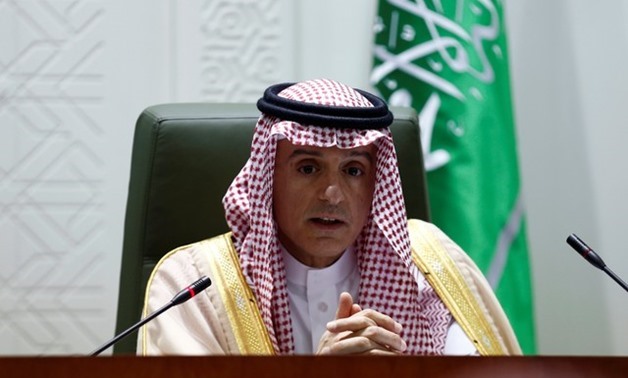
Saudi Foreign Minister Adel Al-Jubeir - File Photo
CAIRO – 20 November 2017: Arab League’s emergency meeting for foreign ministers recommended Arab representatives in the United Nations bring about a Security Council resolution against Iran’s violation to resolution 2231 (2015), concerning the development of a ballistic missile program.
At the end of the emergency meeting titled “Iranian Interference in Arab States’ Affairs,” The Arab foreign ministers issued a statement Sunday in which they condemned the Iranian regime supplying missiles to Houthi rebels in Yemen, who in turn used the weapons against Saudi Arabia, according to Sky News.
The Arab League denounced the ballistic missile fired by the Iranian-backed rebels earlier this month that was intercepted near the Saudi capital, Riyadh. It affirmed its solidarity with the measures Saudi Arabia took to protect its national security.
Addressing the meeting, Saudi Foreign Minister Adel al-Jubeir said the pan-Arab organization needed to take a “serious” decision in dealing with Iran.
“Showing leniency toward Iran will not leave any Arab capital safe from those ballistic missiles,” he said. “We are obliged today to take a serious and honest stand to counter these belligerent policies so that we can protect our security,” Jubeir stressed.
He said his country was targeted by a total of 80 ballistic missiles, fired by Yemen’s Iranian-backed Shiite rebels, since the kingdom led a coalition to fight them alongside the internationally recognized Yemeni government in 2015.
Saudi Arabia, he added, will not stand idly in the face of Iran’s “blatant aggression.”
Yemen, one of the Arab world's poorest countries, has been devastated by a war between forces loyal to the internationally-recognized government of President Abdrabbuh Mansour Hadi and those allied to the Houthi rebel movement.
Alarmed by the rise of a group they believed to be backed militarily by regional Shia power Iran, Saudi Arabia and eight other mostly Sunni Arab states began an air campaign aimed at restoring Hadi's government.
The Houthis remain in control of Yemen’s capital, Sana'a, and most of the country’s north. Government forces and their allies, backed by the Saudi-led coalition, have driven them out of most of the country’s south.
The coalition received logistical and intelligence support from the US, UK, and France.
Syria is another battlefield of the proxy conflict between Shiite Iran and Sunni powerhouse Saudi Arabia; Riyadh has been supporting groups fighting the forces loyal to President Bashar al-Assad. Iran, on the other hand, has supported Assad’s government, providing it with billions of dollars’ worth of economic and military aid since the civil war there began in 2011. Lebanon’s Iranian-backed Hezbollah, a Shiite guerrilla group, and an assortment of Iranian-linked Shiite militias from places like Iraq and Afghanistan have been fighting on the Syrian government’s side.
Shiite-majority Iraq has been ravaged in recent years by cycles of warfare, a growing refugee crisis, crippling sectarianism, and the violent spread of the self-styled Islamic State extremist movement. It shares close military, religious ties, and the Islamic State extremist view with its Iranian neighbor.
Lebanon’s Iranian-backed guerrilla group Hezbollah is a key member in Beirut’s government; Hezbollah was accused by Lebanese Prime Minister Saad al-Hariri of destabilizing the country.
Qatar has been hit by its biggest diplomatic crisis in years after Arab nations including Egypt, Saudi Arabia, the UAE and Bahrain cut ties with the peninsula, accusing it of destabilizing the region with its support of Islamist groups and allowing Iranian interference in the Gulf States’ affairs.
The Arab quartet halted all land, air and sea traffic with Qatar, and withdrew their diplomats and ambassadors from the Qatari peninsula. The Arab quartet issued 13 demands to Doha – then shortened their demands to six principles - including closing Al-Jazeera channel, curbing relations with Iran and shutting a Turkish military base.

Comments
Leave a Comment